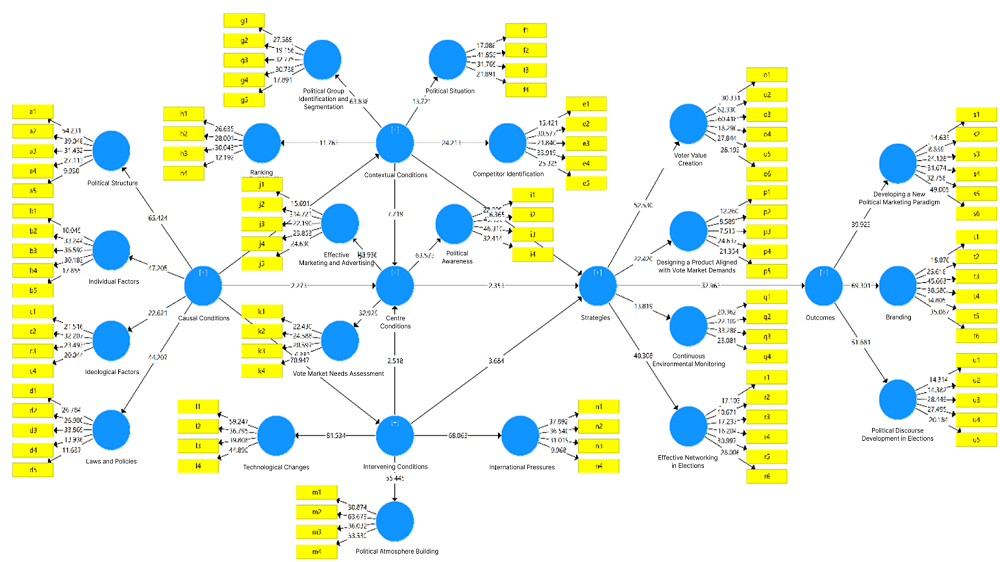Evaluation of the Political Marketing Model with a Focus on Individual Behavior Components
Keywords:
Marketing, Political Marketing, Individual BehaviorAbstract
The present study aims to design and explain a political marketing model with a focus on individual behavior components. The data collection method in this study was conducted using both library research and field research. The data collection tool in the quantitative section was a researcher-made questionnaire, developed based on the results of the qualitative section and distributed among 310 individuals using non-probability random sampling. For qualitative data analysis, inductive qualitative content analysis was employed. For quantitative data analysis, descriptive statistics were used, and for examining the research questions, inferential statistics and the partial least squares (PLS) method were applied using SPSS and SMARTPLS software. The study's findings indicate that individual factors, including variables such as political awareness, vote market needs assessment, and value creation for voters, play a key role in stimulating and directing voter behavior. Marketing and media factors include variables such as media framing, effective marketing and advertising, branding, and the development of a new paradigm in political marketing. Additionally, environmental and technological factors encompass variables such as technological changes, international pressures, and continuous environmental monitoring. These factors, as external variables, shape the political and social environment and influence marketing strategies. However, leveraging voters’ political awareness to develop targeted electoral messages and designing political marketing strategies with an emphasis on technology and media can create greater impact.
References
A. Abid and S. K. Roy, "Social Media Marketing: Adoption, Strategies, Approaches, Audience Behavior, and Content for Political Marketing," in The Impact of Digitalization on Current Marketing Strategies: Emerald Publishing Limited, 2024.
S. Zainali, J. Lindahl, J. Lindén, and B. Stridh, "LCOE distribution of PV for single-family dwellings in Sweden," Energy Reports, vol. 10, pp. 1951-1967, 2023, doi: 10.1016/j.egyr.2023.08.042.
F. Guzmán, D. Alvarado-Karste, F. Ahmad, D. Strutton, and E. L. Kennedy, "Investigating the effects of political correctness in social marketing messaging," European Journal of Marketing, vol. 58, no. 11, pp. 2473-2507, 2024, doi: 10.1108/EJM-05-2023-0375.
Nofrizal, A. Aznuriyandi, Z. Zulkarnain, and S. Sucherly, "Winning the election; determining the main reasons for decision to vote in religious country," Journal of Islamic Marketing, vol. 15, no. 11, pp. 3223-3246, 2024, doi: 10.1108/JIMA-08-2023-0261.
K. Akdim, "The influence of eWOM. Analyzing its characteristics and consequences, and future research lines," Spanish Journal of Marketing-ESIC, vol. 25, no. 2, pp. 239-259, 2021, doi: 10.1108/978-1-83753-686-320241007.
P. C. P. Yones and S. Muthaiyah, "eWOM via the TikTok application and its influence on the purchase intention of somethinc products," Asia Pacific Management Review, vol. 28, no. 2, pp. 174-184, 2022, doi: 10.1016/j.apmrv.2022.07.007.
F. Calza, A. Sorrentino, and I. Tutore, "Combining corporate environmental sustainability and customer experience management to build an integrated model for decision-making," Management Decision, vol. 61, no. 13, pp. 54-84, 2023, doi: 10.1108/MD-05-2022-0613.
F. Rajabpour and H. Alizadeh, "Investigating the impact of environmental factors on the adoption of social media among small and medium enterprises during the Covid-19 crisis," in The 6th National Conference and the 3rd International Conference on New Patterns of Business Management in Unstable Conditions, 2024, pp. 1-13, doi: 10.61838/kman.jayps.4.9.6.
A. Adel Tantawy, J. Amankwah-Amoah, and P. Puthusserry, "Political ties in emerging markets: a systematic review and research agenda," International Marketing Review, vol. 40, no. 6, pp. 1344-1378, 2023, doi: 10.1108/IMR-09-2022-0197.
H. Alizadeh and M. Foroughi, "A Strategic SWOT Analysis of Leading Electronics Companies based on Artificial intelligence," International Journal of Business Management and Entrepreneurship (IJBME), vol. 2, no. 2, pp. 1-16, 2023.
A. Mehrani, H. Alizadeh, and A. Rasouli, "Evaluation of the Role of Artificial Intelligence Tools in the Development of Financial Services and Marketing," Journal of Technology in Entrepreneurship and Strategic Management, vol. 1, no. 1, pp. 71-82, 2022.
J. Frederik, "Online Political Microtargeting: Promises and Threats for Democracy," Utrecht Law Review, vol. 14, no. 1, pp. 1-15, 2018, doi: 10.18352/ulr.420.
I. M. Hegazy, "The effect of political neuromarketing 2.0 on election outcomes: The case of Trump’s presidential campaign 2016," Review of Economics and Political Science, vol. 6, no. 3, pp. 235-251, 2021, doi: 10.1108/REPS-06-2019-0090.












